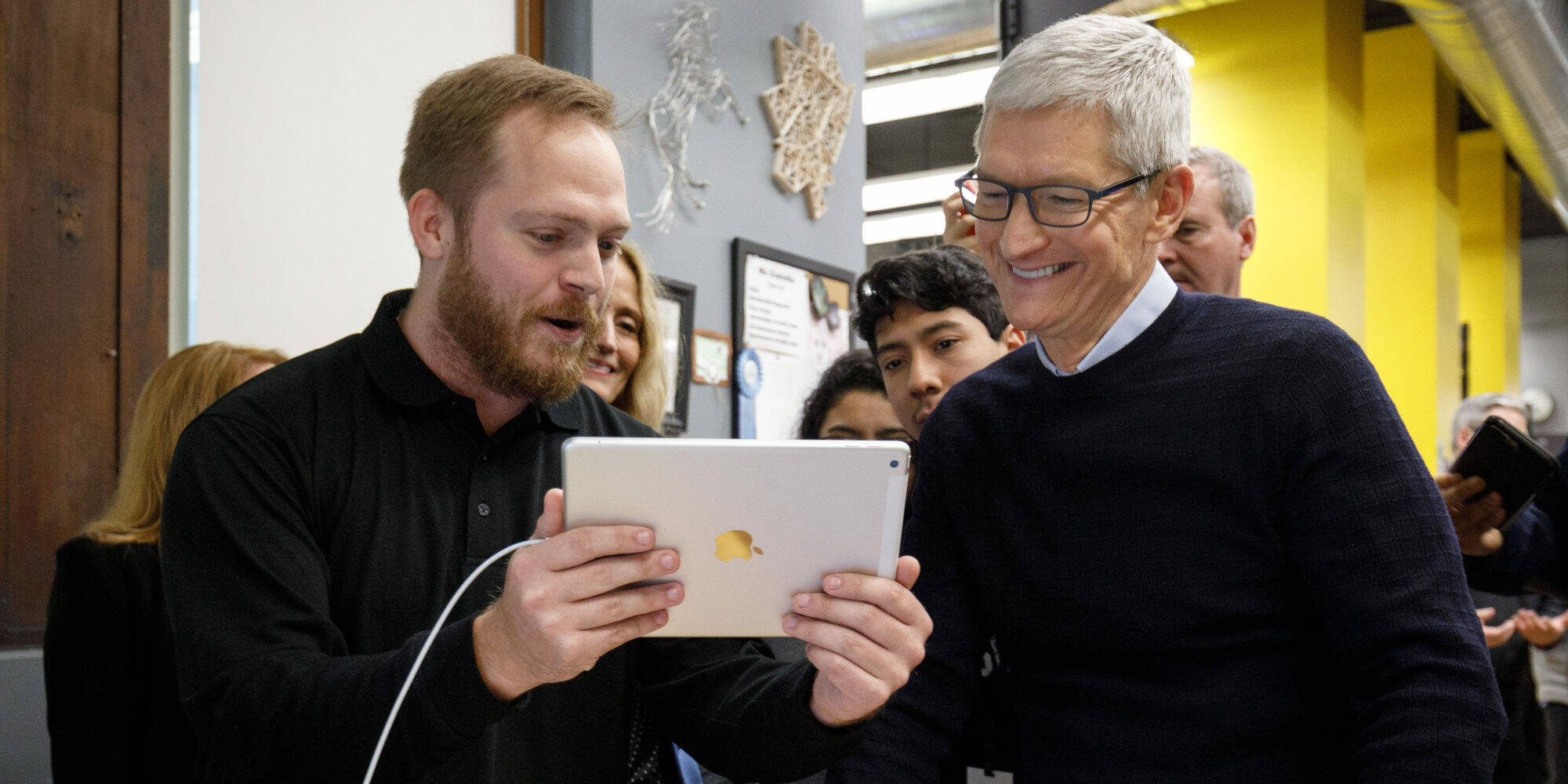As Apple Sales Slide, Tim Cook Says Fanbois Will Tolerate Higher IPhone Prices

Apple has reported its first decline in revenues since 2019 as sales of Macs and iPhones both slowed – the latter in the wake of a shutdown at iPhone City, Foxconn's factory in China, late last year.
For the quarter ended on December 31, Apple's Q1 of its fiscal 2024, it posted revenue of $117.2 billion, down 5 percent year-over-year. Net income was $29.998 billion, a 13.4 percent drop. We are sure every reader here will shed a tear to hear that this was a disappointment to Wall Street, which expected $122 billion in sales and $31 billion in profit.
The company was keen to talk up its bright spot – Services, where iTunes lives – at $20.77 billion, up 6.4 percent year-over-year. CFO Luca Maestri said the company "saw very good results in our cloud services business in payment services. Music was very strong."
It's not like Apple didn't know this was coming. Maestri predicted a slowdown in the October earnings call for Q4 2022. And so it came to pass: Mac revenue took a "significant" hit in 2023's first quarter. Mac topline for the Christmas quarter was $7.7 billion, down from $10.9 billion a year earlier.
When asked about Mac shipments relative to the rest of the PC industry as a whole on last night's call, CEO Tim Cook opined: "The industry is very challenged, as you say. It's – the industry is contracting."
PC shipments were down more than 28 percent in calendar Q4, according to IDC. And things aren't going to improve for device makers this year, Gartner said this week.
Cook refused to predict Apple's year in Macs, instead he pointed out the company has a "low share, and... a competitive advantage with Apple silicon," conceding that things would be "a little rough in the short term."
iPhones similarly saw a drop, with revenues reported at $65.8 billion, down from $71.6 billion in the same quarter last year, largely due to supply chain issues across the industry and in China specifically at Apple's contractor, Foxconn. The Zhengzhou plant "iPhone City" serves both Chinese and global markets, and those COVID and strike disruptions could not have come at a worse time because they hit the Thanksgiving/Black Friday/Christmas shopping spree trifecta, all potential big money spinners for Apple's holiday quarter.
Although Apple has been looking to reduce production in the region, it may not be so simple, despite moves to diversify its supply chain by shifting to Vietnam and India. Research firm Counterpoint, for example, has said that before the 2022 COVID outbreak in October that prompted shutdowns in Zhengzhou, the factory was where 85 percent of the company's flagship iPhone Pros were manufactured.
- US government calls foul on Apple and Google over walled gardens for apps
- Watchdog: There just may be something in these claims Apple broke labor laws
- US in talks with critical chip tech countries Netherlands, Japan. Topic? China sanctions
- Phone the rich: Premium handsets sole survivors of slump in India, China
Analysts at Reuters noted last year that Apple's supply chain exposure to China as far as global manufacturing goes is smaller, though still significant: it claims that from 2014 to 2019, China was the primary location of 44 percent to 47 percent of its suppliers' factories, but said that had fallen to 36 percent by 2021.
Cornell Uni associate professor Eli Friedman told the newswire: "The China supply chain is not going to evaporate overnight... Decoupling is just not realistic for these companies for the time being." It noted that he expects diversification to "accelerate," however.
We've got them where we want them
Analysts on last night's earnings conference call also highlighted Apple's move to higher average selling prices (ASPs) and asked whether it was "sustainable" or might "reverse in a tighter consumer spending environment."
Apple is betting big that people are prepared to dig deep to get hold of the newest and latest iPhone, with Cook apparently confident that residents of the walled garden would never want to hop over into Android land, and will keep upgrading rather than sticking to their old iPhones.
When asked last night about whether the market would tolerate a hike in iPhone ASPs during a "tough macro environment," Cook said: "I wouldn't want to predict, but I would say... the iPhone has become so integral into people's lives. It contains their contacts and their health information and their banking information and their smart home and so many different parts of their lives, their payment vehicle and – for many people. And so I think people are willing to really stretch to get the best they can afford in that category."
That's a yes, folks. ®
From Chip War To Cloud War: The Next Frontier In Global Tech Competition
The global chip war, characterized by intense competition among nations and corporations for supremacy in semiconductor ... Read more
The High Stakes Of Tech Regulation: Security Risks And Market Dynamics
The influence of tech giants in the global economy continues to grow, raising crucial questions about how to balance sec... Read more
The Tyranny Of Instagram Interiors: Why It's Time To Break Free From Algorithm-Driven Aesthetics
Instagram has become a dominant force in shaping interior design trends, offering a seemingly endless stream of inspirat... Read more
The Data Crunch In AI: Strategies For Sustainability
Exploring solutions to the imminent exhaustion of internet data for AI training.As the artificial intelligence (AI) indu... Read more
Google Abandons Four-Year Effort To Remove Cookies From Chrome Browser
After four years of dedicated effort, Google has decided to abandon its plan to remove third-party cookies from its Chro... Read more
LinkedIn Embraces AI And Gamification To Drive User Engagement And Revenue
In an effort to tackle slowing revenue growth and enhance user engagement, LinkedIn is turning to artificial intelligenc... Read more

